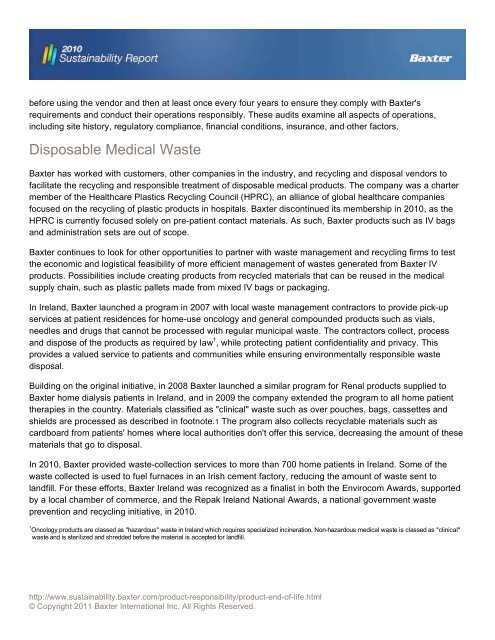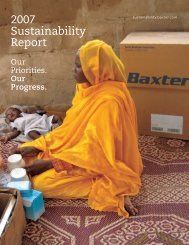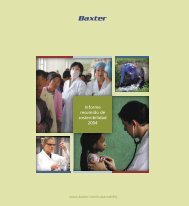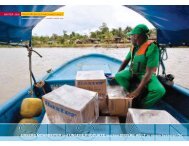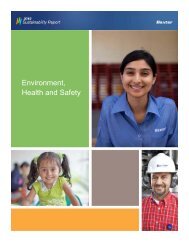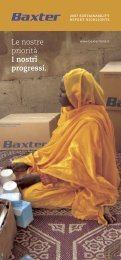Product Responsibility - Baxter Sustainability Report
Product Responsibility - Baxter Sustainability Report
Product Responsibility - Baxter Sustainability Report
- No tags were found...
You also want an ePaper? Increase the reach of your titles
YUMPU automatically turns print PDFs into web optimized ePapers that Google loves.
efore using the vendor and then at least once every four years to ensure they comply with <strong>Baxter</strong>'srequirements and conduct their operations responsibly. These audits examine all aspects of operations,including site history, regulatory compliance, financial conditions, insurance, and other factors.Disposable Medical Waste<strong>Baxter</strong> has worked with customers, other companies in the industry, and recycling and disposal vendors tofacilitate the recycling and responsible treatment of disposable medical products. The company was a chartermember of the Healthcare Plastics Recycling Council (HPRC), an alliance of global healthcare companiesfocused on the recycling of plastic products in hospitals. <strong>Baxter</strong> discontinued its membership in 2010, as theHPRC is currently focused solely on pre-patient contact materials. As such, <strong>Baxter</strong> products such as IV bagsand administration sets are out of scope.<strong>Baxter</strong> continues to look for other opportunities to partner with waste management and recycling firms to testthe economic and logistical feasibility of more efficient management of wastes generated from <strong>Baxter</strong> IVproducts. Possibilities include creating products from recycled materials that can be reused in the medicalsupply chain, such as plastic pallets made from mixed IV bags or packaging.In Ireland, <strong>Baxter</strong> launched a program in 2007 with local waste management contractors to provide pick-upservices at patient residences for home-use oncology and general compounded products such as vials,needles and drugs that cannot be processed with regular municipal waste. The contractors collect, processand dispose of the products as required by law 1 , while protecting patient confidentiality and privacy. Thisprovides a valued service to patients and communities while ensuring environmentally responsible wastedisposal.Building on the original initiative, in 2008 <strong>Baxter</strong> launched a similar program for Renal products supplied to<strong>Baxter</strong> home dialysis patients in Ireland, and in 2009 the company extended the program to all home patienttherapies in the country. Materials classified as "clinical" waste such as over pouches, bags, cassettes andshields are processed as described in footnote.1 The program also collects recyclable materials such ascardboard from patients' homes where local authorities don't offer this service, decreasing the amount of thesematerials that go to disposal.In 2010, <strong>Baxter</strong> provided waste-collection services to more than 700 home patients in Ireland. Some of thewaste collected is used to fuel furnaces in an Irish cement factory, reducing the amount of waste sent tolandfill. For these efforts, <strong>Baxter</strong> Ireland was recognized as a finalist in both the Envirocom Awards, supportedby a local chamber of commerce, and the Repak Ireland National Awards, a national government wasteprevention and recycling initiative, in 2010.1Oncology products are classed as "hazardous" waste in Ireland which requires specialized incineration. Non-hazardous medical waste is classed as "clinical"waste and is sterilized and shredded before the material is accepted for landfill.http://www.sustainability.baxter.com/product-responsibility/product-end-of-life.html© Copyright 2011 <strong>Baxter</strong> International Inc. All Rights Reserved.


